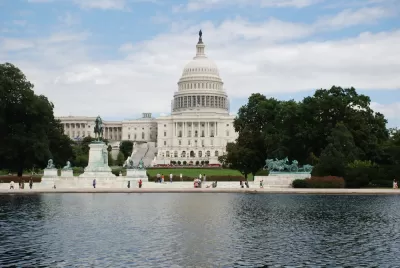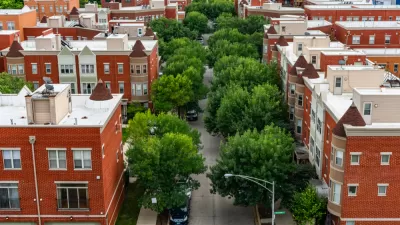A couple of questions are fundamental to the debate about the housing affordability crisis.

[Updated: August 19, 2019]
An article by Solomon Greene raises the question of whether deregulation can solve the affordable housing crisis, and, more specifically, whether the federal government can play a hand in that deregulation.
The Trump administration is making at least initial gestures toward trying to do just that. In June, President Donald Trump signed an executive order establishing the "White House Council on Eliminating Regulatory Barriers to Affordable Housing." Democratic candidates for president are also pushing for fewer regulations as one tool for combating the rising costs of housing. The New York Times Editorial Board yesterday announced its support published an editorial supporting the idea of more construction as one potential solution to housing affordability.
"This embrace of deregulation merits particular praise because the states most resistant to allowing housing construction are the strongholds of the Democratic Party, in the Northeast and along the Pacific Coast, and the most resistant voters are the wealthy residents of those states who provide so much of the funding for Democratic presidential campaigns," according to the editorial.
Returning to the earlier article, Solomon builds a case that the federal government has multiple avenues by which it can influence the housing market, including subsidies, ending or prohibiting exclusionary barriers, identifying the helpful regulations among the harmful, and supporting bottom-up initiatives. On that last point, Solomon writes:
Effective policies will also require a strong emphasis on community engagement from the outset, and ongoing monitoring of implementation and evaluation of outcomes. The federal government used this model under the Sustainable Communities Initiative and began to apply it more broadly through the US Department of Housing and Urban Development’s Affirmatively Furthering Fair Housing rule before Secretary Carson suspended its implementation. Mining lessons from each of these efforts will be key to the success of new initiatives.
FULL STORY: Can We Deregulate Ourselves out of the Affordable Housing Crisis?

Alabama: Trump Terminates Settlements for Black Communities Harmed By Raw Sewage
Trump deemed the landmark civil rights agreement “illegal DEI and environmental justice policy.”

Study: Maui’s Plan to Convert Vacation Rentals to Long-Term Housing Could Cause Nearly $1 Billion Economic Loss
The plan would reduce visitor accommodation by 25% resulting in 1,900 jobs lost.

Planetizen Federal Action Tracker
A weekly monitor of how Trump’s orders and actions are impacting planners and planning in America.

Waymo Gets Permission to Map SF’s Market Street
If allowed to operate on the traffic-restricted street, Waymo’s autonomous taxis would have a leg up over ride-hailing competitors — and counter the city’s efforts to grow bike and pedestrian on the thoroughfare.

Parklet Symposium Highlights the Success of Shared Spaces
Parklets got a boost during the Covid-19 pandemic, when the concept was translated to outdoor dining programs that offered restaurants a lifeline during the shutdown.

Federal Homelessness Agency Places Entire Staff on Leave
The U.S. Interagency Council on Homelessness is the only federal agency dedicated to preventing and ending homelessness.
Urban Design for Planners 1: Software Tools
This six-course series explores essential urban design concepts using open source software and equips planners with the tools they need to participate fully in the urban design process.
Planning for Universal Design
Learn the tools for implementing Universal Design in planning regulations.
Caltrans
Smith Gee Studio
Institute for Housing and Urban Development Studies (IHS)
City of Grandview
Harvard GSD Executive Education
Toledo-Lucas County Plan Commissions
Salt Lake City
NYU Wagner Graduate School of Public Service





























